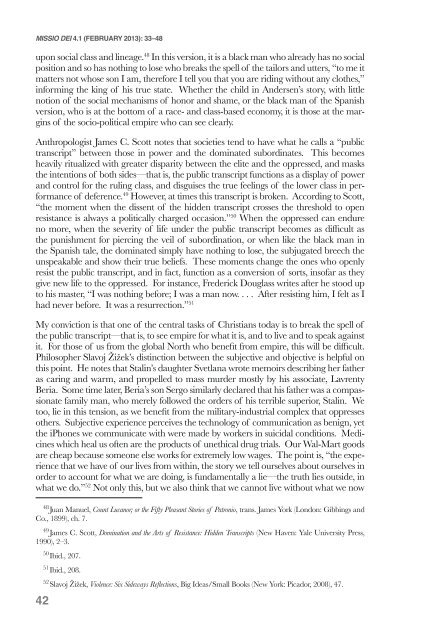VULNERABLE MISSION
VULNERABLE MISSION
VULNERABLE MISSION
You also want an ePaper? Increase the reach of your titles
YUMPU automatically turns print PDFs into web optimized ePapers that Google loves.
MISSIO DEI 4.1 (FEBRUARY 2013): 33–48<br />
upon social class and lineage. 48 In this version, it is a black man who already has no social<br />
position and so has nothing to lose who breaks the spell of the tailors and utters, “to me it<br />
matters not whose son I am, therefore I tell you that you are riding without any clothes,”<br />
informing the king of his true state. Whether the child in Andersen’s story, with little<br />
notion of the social mechanisms of honor and shame, or the black man of the Spanish<br />
version, who is at the bottom of a race- and class-based economy, it is those at the margins<br />
of the socio-political empire who can see clearly.<br />
Anthropologist James C. Scott notes that societies tend to have what he calls a “public<br />
transcript” between those in power and the dominated subordinates. This becomes<br />
heavily ritualized with greater disparity between the elite and the oppressed, and masks<br />
the intentions of both sides—that is, the public transcript functions as a display of power<br />
and control for the ruling class, and disguises the true feelings of the lower class in performance<br />
of deference. 49 However, at times this transcript is broken. According to Scott,<br />
“the moment when the dissent of the hidden transcript crosses the threshold to open<br />
resistance is always a politically charged occasion.” 50 When the oppressed can endure<br />
no more, when the severity of life under the public transcript becomes as difficult as<br />
the punishment for piercing the veil of subordination, or when like the black man in<br />
the Spanish tale, the dominated simply have nothing to lose, the subjugated breech the<br />
unspeakable and show their true beliefs. These moments change the ones who openly<br />
resist the public transcript, and in fact, function as a conversion of sorts, insofar as they<br />
give new life to the oppressed. For instance, Frederick Douglass writes after he stood up<br />
to his master, “I was nothing before; I was a man now. . . . After resisting him, I felt as I<br />
had never before. It was a resurrection.” 51<br />
My conviction is that one of the central tasks of Christians today is to break the spell of<br />
the public transcript—that is, to see empire for what it is, and to live and to speak against<br />
it. For those of us from the global North who benefit from empire, this will be difficult.<br />
Philosopher Slavoj Žižek’s distinction between the subjective and objective is helpful on<br />
this point. He notes that Stalin’s daughter Svetlana wrote memoirs describing her father<br />
as caring and warm, and propelled to mass murder mostly by his associate, Lavrenty<br />
Beria. Some time later, Beria’s son Sergo similarly declared that his father was a compassionate<br />
family man, who merely followed the orders of his terrible superior, Stalin. We<br />
too, lie in this tension, as we benefit from the military-industrial complex that oppresses<br />
others. Subjective experience perceives the technology of communication as benign, yet<br />
the iPhones we communicate with were made by workers in suicidal conditions. Medicines<br />
which heal us often are the products of unethical drug trials. Our Wal-Mart goods<br />
are cheap because someone else works for extremely low wages. The point is, “the experience<br />
that we have of our lives from within, the story we tell ourselves about ourselves in<br />
order to account for what we are doing, is fundamentally a lie—the truth lies outside, in<br />
what we do.” 52 Not only this, but we also think that we cannot live without what we now<br />
42<br />
48 Juan Manuel, Count Lucanor; or the Fifty Pleasant Stories of Patronio, trans. James York (London: Gibbings and<br />
Co., 1899), ch. 7.<br />
49 James C. Scott, Domination and the Arts of Resistance: Hidden Transcripts (New Haven: Yale University Press,<br />
1990), 2–3.<br />
50 Ibid., 207.<br />
51 Ibid., 208.<br />
52 Slavoj Žižek, Violence: Six Sideways Reflections, Big Ideas/Small Books (New York: Picador, 2008), 47.


